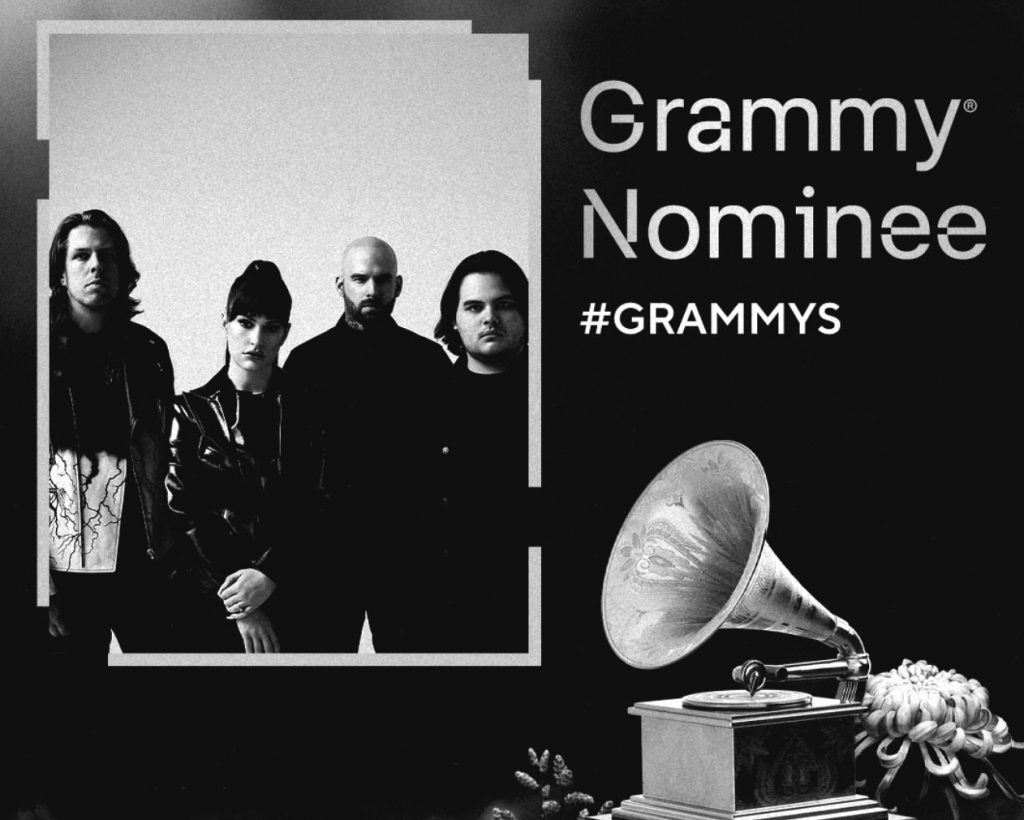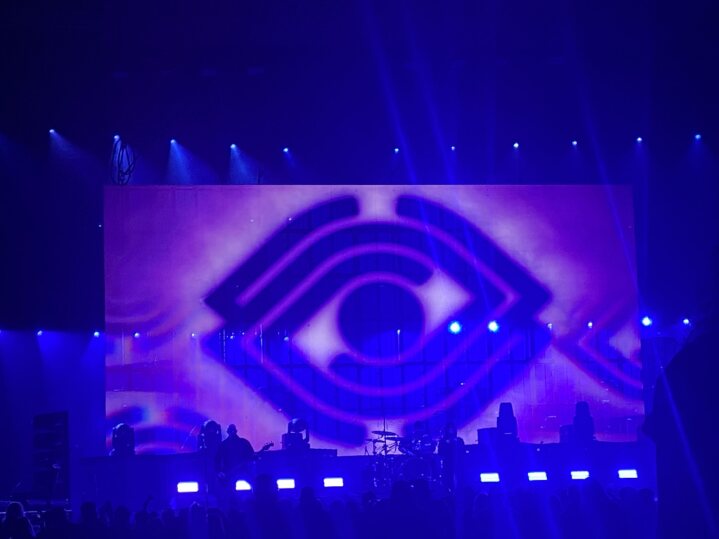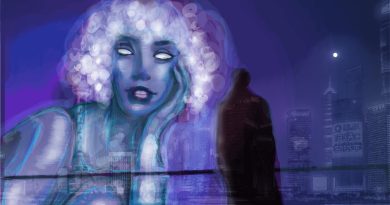ALBUM REVIEW: Spiritbox’s “Tsunami Sea”
Alternative metal band Spiritbox released their second studio album “Tsunami Sea,” following their successful 2021 debut album “Eternal Blue.”
By: Michael Doyle
Metal band Spiritbox is still riding a wave of success after their 2024 Grammy Award nomination and tour with widely recognized bands Korn and Gojira. The band’s latest album “Tsunami Sea” continues their triumph through an assortment of different styles and sounds.
Originating from Vancouver Island, British Columbia, Canada, Spiritbox formed in 2016 and have released two albums, four EPs and 20 singles since then. Led by frontwoman Courtney LaPlante, the band has become one of the fastest rising groups in the metal scene, due to their heavy instrumentals, experimentation and LaPlante’s ability to smoothly switch between clean vocals and harsh screams.
I was introduced to Spiritbox during their opening performance for Korn and Gojira in October at the Tacoma Dome and was very impressed with their sound. Once “Tsunami Sea” was announced, I chose to wait until the full album was released before listening. The singles “Soft Spine,” “Perfect Soul” and “No Loss, No Love” were each released Sept. 6, Nov. 18 and Feb. 6.
The album opens with “Fata Morgana” as a harmonic guitar riff introduces the song before LaPlante enters with her harsh screams. The song appropriately details a mirage and switches between heavy verses and cleaner choruses, a pattern revisited many times in the album. LaPlante’s lyricism uses sea-related verbiage, fitting the name of the album.

The song also includes an eerily tense bridge into the final chorus, another nice inclusion to its structure. The song contains a little bit of everything and serves as a very good opener to the album, hinting to what you can expect next. I highly enjoyed this song, most notably the guitar tones used throughout it.
Loosely inspired by the film “Beyond the Black Rainbow,” the second track of the album “Black Rainbow” opens with a pulsating beat, erupting into a drum and guitar-filled intro. LaPlante uses a monotone and robotic voice for the verses and bridge, which chants “Dissolve, displace, rejoice, repeat” in increasing volume before exploding into the outro.
One of the most aggressive tracks on the album, “Black Rainbow” is a pretty textbook Spiritbox track, and while it doesn’t do anything new, it shows the standard that the band has set for themselves.
Capturing a sound reminiscent of 2000s alternative metal, “Perfect Soul” opens with a guitar riff intro and then is met with LaPlante’s clean vocals. Fans pointed out a reference to their earlier work, with LaPlante singing “Carried in the ebb and flow,” which she later confirmed references “The Summit” off their debut album.
LaPlante stated on X that everything is always connected. I enjoyed the callback of sound, and while it was lighter than the previous tracks, “Perfect Soul” still contains the emotion and punch consistent with the band’s previous work.
“Keep Sweet” begins sounding more like pop music than what is expected, quickly reverting to the aggressive and scream-filled roots in the choruses, much like “Fata Morgana.” This is one of Spiritbox’s greatest tools and it’s reassuring to see them work to their strengths in song structure. I would describe this as a safe song, as it further establishes Spiritbox’s sound while slowly deviating towards experimenting with different styles.
The first single of the album, “Soft Spine” was immediately my favorite upon listening.
With consistently pounding drums, ear-deafening guitar and bass and LaPlante’s fierce screams, “Soft Spine” is as unapologetic as its lyrics. It calls out people who are rewarded for their insidious behavior, as LaPlante claims they will be sorted when they die.
Spiritbox never takes the foot off the gas pedal in this song, and I see it cementing itself in Spiritbox’s greatest hits when everything is said and done.
In a turn of events online, Ronnie Radke of the band Falling in Reverse called out both the song and Spiritbox after a fan on X said it was about him, stating that she cheated on her husband with Tillian, formerly of the band Dance Gavin Dance. This was a baseless claim in my opinion to attempt to drag Spiritbox down, as Radke has a history of starting beef with other musicians online to gain attention, dating back to numerous tour dates with Falling in Reverse in 2023. Radke clearly was upset, giving me more reason to like “Soft Spine.”
The album’s title track, “Tsunami Sea” details an unstable relationship and not living up to someone’s vision. The song is moderate in terms of its heaviness on the album, and the lyricism blends metaphors and poetry in a melody of mature songwriting. A very nice instrumental is included into the bridge, showcasing each musician’s skills on a radio-friendly song.
“A Haven With Two Faces” opens with a picked guitar intro into a pounding verse, setting the theme for a song that transitions between heavy verses into softer choruses. Although this pattern is common in metal, as someone who grew up listening to the inverse pattern from bands like Nirvana and Pixies, it’s a fresh song structure to me. The breakdown of the song is very high in energy and transitions into an aggressive bridge, capturing the intensity of Spiritbox strongly.
The following tracks, “No Loss, No Love” and “Crystal Roses” reflect the band experimenting with blending genres. “No Loss, No Love” features monologued sections to transition between verses and choruses, and “Crystal Roses” is closer to an EDM track than metal.
Both songs were not my forte, and I didn’t mind “No Loss, No Love” but found the stop-and-go pattern and abrupt ending a bit dissatisfying. “Crystal Roses” simply lacks much of what I enjoy about Spiritbox, and while I commend them for exploring new sounds and wouldn’t be opposed to them diversifying their sound, EDM is not my favorite by any means and stuck out notably for the wrong reasons on the album.
“Ride The Wave” is the next song, which I didn’t enjoy as much either. “Tsunami Sea” stuck out to me for it’s at times underproduced sound that successfully translates the energy of Spiritbox, but “Ride The Wave” sounded overproduced in comparison. This stretch of songs towards the end of the album makes things feel front-heavy, but an 11-track album is no easy accomplishment.
It’s possible these songs felt weaker simply because of how good everything else sounded.
Closing out the album is “Deep End,” as the song features a more technical guitar melody, climaxing in a picked outro. LaPlante’s clean vocals, especially in higher notes are highlighted here and showcase the pleasant sounds the talented band is capable of. “Deep End” is a touching finish to “Tsunami Sea” and was placed perfectly on the track list.
Overall, “Tsunami Sea” had more strengths than weaknesses and incorporated a healthy mix of alternative metal, with signature Spiritbox tracks and experimental sounds, all within a 43-minute-long album. “Soft Spine,” “Tsunami Sea” and “Fata Morgana” came out as my favorites and the album will certainly boost Spiritbox’s stock as they continue to rise higher in the world of alternative music.
“Tsunami Sea” is available to stream on all streaming platforms.






